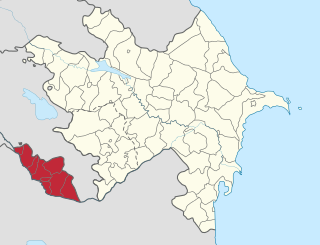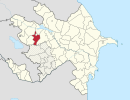
Azerbaijan, officially the Republic of Azerbaijan, is a country in the Caucasus region of Eurasia. Located at the crossroads of Eastern Europe and Western Asia, it is bounded by the Caspian Sea to the east, the Russian republic of Dagestan to the north, Georgia to the northwest, Armenia and Turkey to the west, and Iran to the south.

The Armed Forces of Azerbaijan were re-established according to the Law of the Republic of Azerbaijan on the Armed Forces from 9 October 1991. The Azerbaijan Democratic Republic (ADR) had originally formed its own armed forces from 26 June 1918 but were dissolved after Azerbaijan was absorbed into the Soviet Union as the Azerbaijan Soviet Socialist Republic from 28 April 1920. After the Soviet Union dissolved in 1991–92, the armed forces were reformed based on Soviet bases and equipment left on Azeri soil.

Baku is the capital and largest city of Azerbaijan, as well as the largest city on the Caspian Sea and of the Caucasus region. Baku is located 28 metres (92 ft) below sea level, which makes it the lowest lying national capital in the world and also the largest city in the world located below sea level. Baku lies on the southern shore of the Absheron Peninsula, alongside the Bay of Baku. At the beginning of 2009, Baku's urban population was estimated at just over two million people. Officially, about 25% of all inhabitants of the country live in Baku's metropolitan area. Baku is the sole metropolis in Azerbaijan.

Nagorno-Karabakh is a landlocked region in the South Caucasus, within the mountainous range of Karabakh, lying between Lower Karabakh and Zangezur, and covering the southeastern range of the Lesser Caucasus mountains. The region is mostly mountainous and forested.

Azerbaijani or Azeri, also referred to as Azerbaijani Turkic or Azerbaijani Turkish, is a Turkic language spoken primarily by the Azerbaijani people, who live mainly in the Republic of Azerbaijan where the North Azerbaijani variety is spoken, and in the Azerbaijan region of Iran, where the South Azerbaijani variety is spoken. Although there is a very high degree of mutual intelligibility between both forms of Azerbaijani, there are significant differences in phonology, lexicon, morphology, syntax and sources of loanwords.

The Nakhchivan Autonomous Republic is a landlocked exclave of the Republic of Azerbaijan. The region covers 5,502.75 km2 (2,124.62 sq mi) with a population of 414,900, bordering Armenia to the east and north, Iran to the south and west, and Turkey to the northwest.

Azerbaijan, officially the Azerbaijan Soviet Socialist Republic, also referred to as Soviet Azerbaijan, was one of the constituent republics of the Soviet Union between 1922 and 1991. Created on 28 April 1920 when the Russian Soviet Federative Socialist Republic brought pro-Soviet figures to power in the region, the first two years of the Azerbaijani SSR were as an independent country until incorporation into the Transcausasian SFSR, along with the Armenian SSR and the Georgian SSR.
Azerbaijan is administratively divided into the following subdivisions:

East Azerbaijan Province is one of the 31 provinces of Iran. It is located in Iranian Azerbaijan, bordering with Armenia, Republic of Azerbaijan, Ardabil Province, West Azerbaijan Province, and Zanjan Province. The capital of East Azerbaijan is Tabriz. East Azerbaijan Province is in Regions 3 of Iran, with its secretariat located in its capital city, Tabriz.

The Azerbaijan national football team is the national football team of Azerbaijan and is controlled by Association of Football Federations of Azerbaijan. It represents Azerbaijan in international football competitions. The majority of Azerbaijan's home matches are held at the national stadium, Baku Olympic Stadium, with friendly matches sometimes hosted at club stadiums.

Azerbaijanis or Azeris, also known as Azerbaijani Turks, are a Turkic ethnic group with mixed Caucasian and Iranian background, living mainly in the sovereign Republic of Azerbaijan and the Azerbaijan region of Iran. They are the second-most numerous ethnic group among the Turkic peoples after Turkish people and are predominantly Shia Muslims. They comprise the largest ethnic group in the Republic of Azerbaijan and the second-largest ethnic group in neighboring Iran and Georgia. The world's largest number of ethnic Azerbaijanis live in Iran, followed by the Republic of Azerbaijan. They speak the Azerbaijani language, belonging to the Oghuz branch of the Turkic languages.

Azerbaijan or Azarbaijan, also known as Iranian Azerbaijan, is a historical region in northwestern Iran that borders Iraq, Turkey, the Nakhchivan Autonomous Republic, Armenia, and the Republic of Azerbaijan.

The president of the Republic of Azerbaijan is the head of state of Azerbaijan.

Artsakh, officially the Republic of Artsakh or the Nagorno-Karabakh Republic, is a breakaway state in the South Caucasus supported by Armenia, whose territory is internationally recognized as part of Azerbaijan. Artsakh controls part of the former Nagorno-Karabakh Autonomous Oblast, including the capital of Stepanakert. It is effectively an enclave within Azerbaijan, connected to Armenia only by a 5 km wide corridor maintained by a Russian peacekeeping force.

Göygöl is a rayon (district) in northwestern Azerbaijan. Formerly known as Khanlar, the region was renamed "Göygöl" after Lake Göygöl, the famous blue lake, by the decision of the Parliament of Azerbaijan on April 25, 2008. The administrative center of the rayon is the city of Goygol.

The First Nagorno-Karabakh War was an ethnic and territorial conflict that took place from the late 1980s to May 1994, in the enclave of Nagorno-Karabakh in southwestern Azerbaijan, between the majority ethnic Armenians of Nagorno-Karabakh backed by Armenia, and the Republic of Azerbaijan. As the war progressed, Armenia and Azerbaijan, both former Soviet Republics, entangled themselves in protracted, undeclared mountain warfare in the mountainous heights of Karabakh as Azerbaijan attempted to curb the secessionist movement in Nagorno-Karabakh. The enclave's parliament had voted in favor of uniting itself with Armenia and a referendum, boycotted by the Azerbaijani population of Nagorno-Karabakh, was held, whereby most of the voters voted in favor of independence. The demand to unify with Armenia began in a relatively peaceful manner in 1988; in the following months, as the Soviet Union disintegrated, it gradually grew into an increasingly violent conflict between Armenians and Azerbaijanis, resulting in ethnic cleansing, with the Sumgait (1988) and Baku (1990) pogroms directed against Armenians, and the Khojaly Massacre (1992) directed against Azeris being notable examples. Inter-ethnic clashes between the two broke out shortly after the parliament of the Nagorno-Karabakh Autonomous Oblast (NKAO) in Azerbaijan voted to unify the region with Armenia on 20 February 1988. The declaration of secession from Azerbaijan was the final result of a territorial conflict regarding the land. As Azerbaijan declared its independence from the Soviet Union and removed the powers held by the enclave's government, the Armenian majority voted to secede from Azerbaijan and in the process proclaimed the unrecognized Republic of Nagorno-Karabakh.

The Nagorno-Karabakh conflict is an ethnic and territorial conflict between Armenia and Azerbaijan over the disputed region of Nagorno-Karabakh, inhabited mostly by ethnic Armenians, and seven surrounding districts, inhabited mostly by Azerbaijanis until their expulsion during the First Nagorno-Karabakh War, which are de facto controlled by the self-declared Republic of Artsakh, but are internationally recognized as de jure part of Azerbaijan. The conflict has its origins in the early 20th century, though the present conflict began in 1988, when the Karabakh Armenians demanded that Karabakh be transferred from Soviet Azerbaijan to Soviet Armenia. The conflict escalated into a full-scale war in the early 1990s.

Ilham Heydar oglu Aliyev is the fourth and current president of Azerbaijan, serving since 31 October 2003.

The COVID-19 pandemic in Azerbaijan is part of the worldwide pandemic of coronavirus disease 2019 caused by severe acute respiratory syndrome coronavirus 2. The virus was confirmed to have spread to Azerbaijan when its first case was confirmed in February 2020.

The 2020 Nagorno-Karabakh war, code-named Operation Iron Fist by Azerbaijan, was an armed conflict between Azerbaijan, supported by Turkey, and the self-proclaimed Republic of Artsakh together with Armenia, in the disputed region of Nagorno-Karabakh and surrounding territories. It was the latest escalation of an unresolved conflict over the region, which is internationally recognized as part of Azerbaijan, but partially governed by Artsakh, a breakaway state with an Armenian ethnic majority.




















